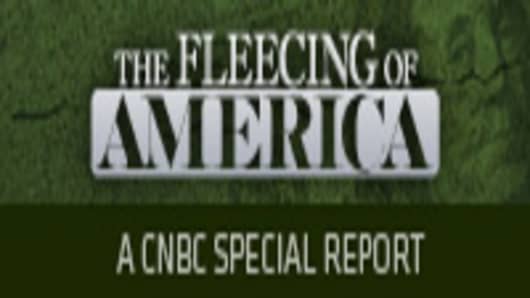As Congress considers new ways to cut spending, here's one idea health advocates are pushing: prevent people on food stamps from using benefits to buy sweetened sodas.
The food stamp program is now called the Supplemental Nutritional Assistance Program (SNAP), serving 42 million Americans who need help. "SNAP users spend about $4 billion a year at supermarkets on soft drinks," says Michael Jacobson of the Center for Science in the Public Interest.
That's taxpayer money, which he says subsidizes soft drink companies and grocery stores, while contributing to the nation's obesity problem. In essence, he argues that you, the taxpayer, have literally become America's "Sugar Daddy".
What's more, those on assistance are least likely able to afford health care, so if they do develop problems related to obesity, their costs become your costs. Preventing access to "sugar water" may save money in the long run.
Maybe. Maybe not.
"Singling out sugar-sweetened beverages, which according to government data account for only 7 percent of total calories in the American diet, is not only simplistic but also overlooks the remaining 93 percent of our daily calories," says the American Beverage Association, which calls Jacobson's assertions "yet another discriminatory attack on a category of products meant to grab headlines and advance a political agenda."
Jacobson says he's been told by grocers that around six percent of SNAP benefits goes toward buying sodas. The USDA says a total of $59 billion was spent on SNAP in the first eight months of this year. Extrapolating that number to 12 months, six percent of the total would actually be higher than the $4 billion Jacobson alleges. He says that money is split "50-50" between soda makers and grocery stores, which is why he calls it a subsidy.
There is some debate over whether cutting off access to soda would cut down on obesity. "Unfortunately, there's not a very good record in the public health community at measures that actually reduce obesity," says John Calfee of the American Enterprise Institute. He says that in places where a tax has been placed on sodas to discourage purchasing them, consumers did switch to other drinks, "but after a while, and really not very along, they adjust. They get calories from some other place, and there's no impact."
Should the government attach strings to money it gives struggling families? "People can decide what to buy without government help," says the American Beverage Association. But SNAP cards already come with some limitations.
"You cannot use it for alcohol or tobacco products," says Michael Jacobson, "but any food product is fair game." Past attempts to ban the use of SNAP benefits for products like sodas or candy have failed. New York City, however, is asking the USDA to do a two-year trial ban to see if it will lead to healthier purchases by the 1.7 million New Yorkers on assistance.
"We estimate that $75 million to $135 million is spent on these products by the food stamp program in New York City every year," says Mayor Michael Bloomberg. SNAP purchases are also not subject to sales taxes, which city leaders argue is another sort of taxpayer subsidy.
The USDA has yet to decide on New York's request for a trial run. However, the agency takes issue with Jacobson's $4 billion figure, though the USDA could not say how much SNAP users spend on sodas.
As for the use of the word "subsidy," a USDA spokesperson tells CNBC, "The SNAP program is not a subsidy program. It is a nutrition assistance program designed to help low income families put nutritious food on the table." The USDA offers nutrition education to SNAP beneficiaries, and it says research shows their purchasing choices do not differ from those who buy groceries without government assistance.
Only Congress can make a permanent change to the benefits program. Jacobson points to the new Congress with hope. "Republicans are probably likelier to restrict food stamp benefits than Democrats," Jacobson says. However, some Republicans may be loathe to give the government greater say in what food choices people have.
All sides agree that if there was a ban on using SNAP cards for sweetened sodas (diet sodas would still be allowed), those on assistance could still buy regular Coke or Pepsi with cash, the way they buy cigarettes or alcohol. But health advocates argue that at least it wouldn't be taxpayers' money going towards those purchases.
As for subsidizing an "unhealthy" industry, soda companies would still benefit if shoppers switch to water or juice, as many of those brands are owned by Coca Cola, Pepsi or Dr. Pepper Snapple Group .
However, the American Beverage Association bristles at the notion that SNAP is a subsidy. "If one were to follow the disjointed logic that SNAP assistance represents a subsidy to beverage manufacturers, then the grower or producer of every single grocery item purchased with SNAP funds would be a subsidy recipient" a spokeperson told CNBC.
Watch Jane Wells' TV report about the "soda subsidy" today on "Street Signs" at 2pm ET, part of CNBC's special coverage of the deficit commission's report to President Obama. Erin Burnett will anchor from Washington DC. And, look for continuing reports on-air and online in our "The Fleecing of America"series, focusing on the federal budget and government spending.





